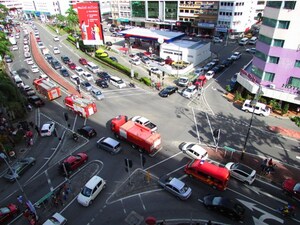Incheon National University Researcher Examines Proactive Change-Oriented Behaviors by Public Service Providers
GWANGJU, South Korea, Feb. 8, 2024 /PRNewswire/ -- Although change-oriented behaviors are critical to high quality public service delivery, encouraging employees to embrace and pursue change in the public sector is difficult. Even with sufficient job autonomy–the principal antidote to resistance to change in the public sector literature–public servants may still lack the incentives, skills, information, and sense of security necessary to engage in proactive change-oriented behavior. Consequently, while job autonomy is undoubtedly important, it alone is not enough, as demonstrated by the many cases in which autonomy fails to lead to change and work process improvements.
Aiming to understand the role played by job autonomy in producing change in public sector organizations, Associate Professor Jesse W. Campbell from Incheon National University has recently published a paper in the journal Review of Public Personnel Administration on December 22, 2023. In this study, the researcher proposes a new theoretical model of change-oriented OCB. The model describes a sophisticated set of conditions under which job autonomy is likely to produce change-oriented behavior: autonomy drives change only in job contexts where workers are provided with rich information about job goals and processes and secondly do not fear unjust punishment by superiors if efforts at change should fail. Only in such contexts will job autonomy lead to higher levels of job mastery and a willingness to pursue change.
The researcher analyzed a large sample of publicly available Korean government employee survey data from the Korean Public Employee Perception Survey collected from August 12 to September 30, 2020. Given the subtlety and number of relationships identified in the conceptual model, Dr. Campbell used structural equation modeling with latent variable interactions terms – an advanced statistical estimation technique – to test the model empirically.
Dr. Campbell says, "It is difficult to create and maintain a culture of change in public organizations. A key contribution of this study lies in its identification of factors over which public managers have some control. These can act as levers that managers can manipulate to encourage change-oriented behavior in their organizations. The factors that can drive change are tractable and managers that genuinely want to encourage their employees to pursue change have tools available to them to facilitate this goal."
While a certain level of job autonomy has been implicated in a variety of organizationally beneficial behaviors as well as the subjective wellbeing of public employees, autonomy should not be considered in isolation but rather as a part of the broader work context which also consists in norms, incentives, job roles, and human relationships. Consequently, simply having job autonomy is not enough for an employee to engage in change-oriented behavior. Rather, its effect is contingent upon other contextual factors that allow and encourage employees to act on their autonomy and pursue change. Only when these conditions are present will public organizations reap the performance rewards of change-oriented behavior.
"If we want change in the public sector, we need to build the cultural, procedural, and managerial foundations on which it can be pursued. Not only must employees have sufficient levels of autonomy to pursue change, but they also need sufficient information and clarity about their tasks. Change must be pursued in an environment where employees are not worried about being unjustly persecuted when attempts at change fail," concludes Dr. Campbell.
Reference
Title of original paper: Job Autonomy, Role Ambiguity, and Procedural Justice: A Multi-Conditional Process Model of Change-Oriented Organizational Citizenship Behavior in Public Organizations
Journal: Review of Public Personnel Administration
DOI: https://doi.org/10.1177/0734371X231214978
*Corresponding author's email: [email protected]
About Incheon National University
Website: https://www.inu.ac.kr/sites/inuengl/index.do
Media contact:
Jung-Kyung Lee
[email protected]
82 32 835 9326
SOURCE Incheon National University

WANT YOUR COMPANY'S NEWS FEATURED ON PRNEWSWIRE.COM?
Newsrooms &
Influencers
Digital Media
Outlets
Journalists
Opted In





Share this article